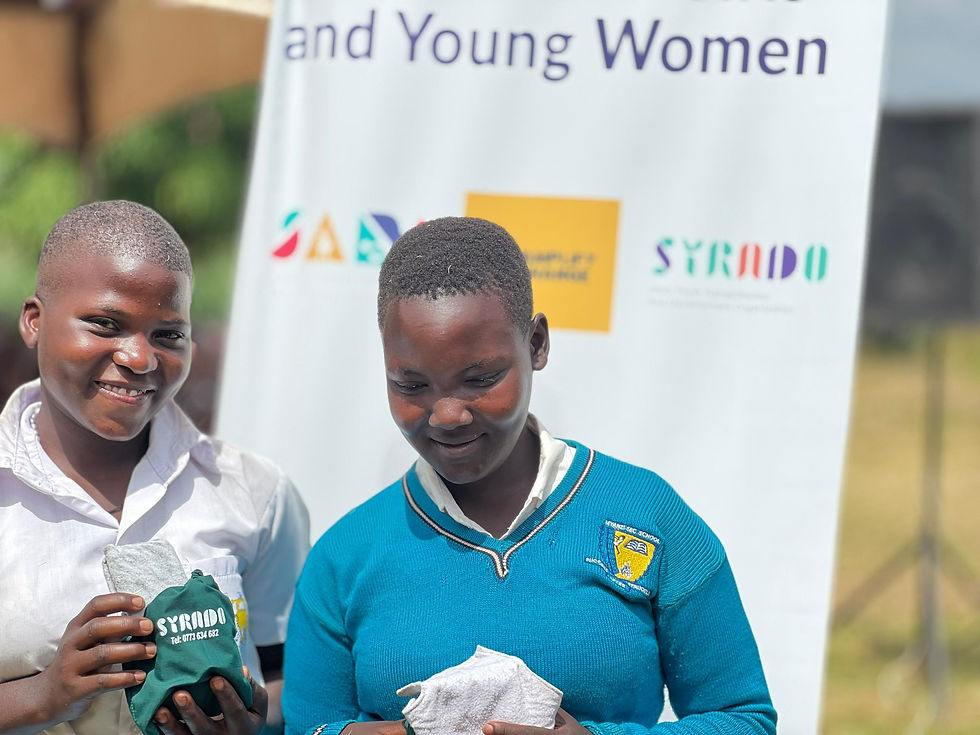Fatuma is one of the many girls in the Myanzi village who use tree leaves and old rugs during her menstrual period. When we talk of lack of pads to use during menstruation in Myanzi village, its understatement. The situation in Myanzi is chronic period poverty.
Kato a young boy narrated that his grandmother keeps on reprimanding his sisters for cutting off pieces of her mattress to be used for pads. Whenever he finds patched holes in the mattress, he knows that his three sisters are in their monthly periods.
“Some of the girls sleep with men like motorcycle riders to get money three thousand five hundred shillings for sanitary pads. Their parents can hardly afford their scholastic materials later sanitary pads. This exposes these young girls to HIV and STIs, unwanted teenage pregnancy with its associated consequences of dropping out of school, being forced into early marriages, getting fistula and social stigma,” narrated one teacher from St Noa Secondary School.
Under the AmplifyChange funded project “Fistula-Free Girls and Young Women” in Uganda, Sanyu Centre for Arts and Rights (SARI) and its partner Slum Youth Rehabilitation and Development Organisation (SYRADO) conducted menstrual health and hygiene management under the campaign of #PeriodFriendlyWorld. The campaign conducted during the menstrual hygiene week (27th to 31st May 2024) was led by SYRADO Uganda who reached over 170 girls and 80 boys in Mt Sinai Secondary School, St Noa Secondary School and Salvation Primary School. The campaign aimed at raising awareness on the need to support girls to have menstrual hygiene products as well as moral support from the males. The participants in the campaign included school heads and teachers, local leaders, media and civil society members. A call was made for menstrual hygiene products to be tax free so that they were affordable to the girls. Moreover, schools needed to have more supportive structures such as gender responsive bathrooms and clean water for girls to stay clean during menstruation.
Through activities including a band procession walking around the community with banners on promoting better menstrual health and hygiene management, skits, question and answers and practical demonstrations, the participatory campaign enabled learning and experience sharing among the girls, boys and community members.
Moreover, girls got more knowledge and practical skills on making and maintaining reusable pads. Girls were equipped with knowledge on washing and changing the pads using warm water and wearing them with clean underwear. They learnt that useable pads needed to be soaked in warm water with very little liquid soap in it. The girls learnt that they were rinsed in the following and hanged with moderate sunlight to dry in a clean environment.
Furthermore, girls and youth got more knowledge on some of the dangers of teenage pregnancies among which was obstetric fistula. Most of them had never had about fistula and how detrimental it was to their health and future. Obstetric fistula one of the most severe aftereffects of birth was largely because of prolonged childbirth with limited access to timely and quality health care. Educators, local leaders and parents saw the need to provide age friendly sexual reproductive health educations to young people, so they make wise decisions.
“I have learnt to value my body and myself. I don’t have to put myself in vulnerable situations that may expose me to getting unwanted pregnancies. Then again, I don’t want to expose myself to devastating health effects of early unwanted pregnancy such as fistula. I will encourage my fellow girls to hold their bodies in high esteem and keep away from wrong relationships that may destroy their lives.” Female student at St Noa Secondary school
“Staying in school is better than getting an unwanted early pregnancy. I now have the knowledge to make better health decisions for my life. I will pass on this information to my peers, so they don’t suffer such negative consequences.” Female student at St Noa Secondary school.
“Now I understand the kind of hardships go through during their monthly periods. I have stopped making fun of them. I will also encourage my fellow boys to stop stigmatizing girls during their periods.” Male student at St Sinai Secondary School.
“When I go back home, I will train my younger sisters and friends in my neighborhood on how to make reusable sanitary pads. This will help us to manage our periods better. We don’t have to miss school anymore or feel embarrassed during our periods.” Female student at Mt Sinai Secondary School.
Every girl deserves to have better menstrual health and hygiene management!









